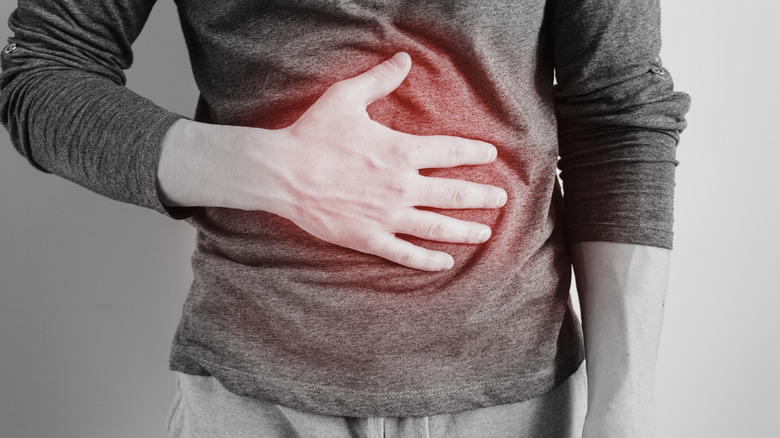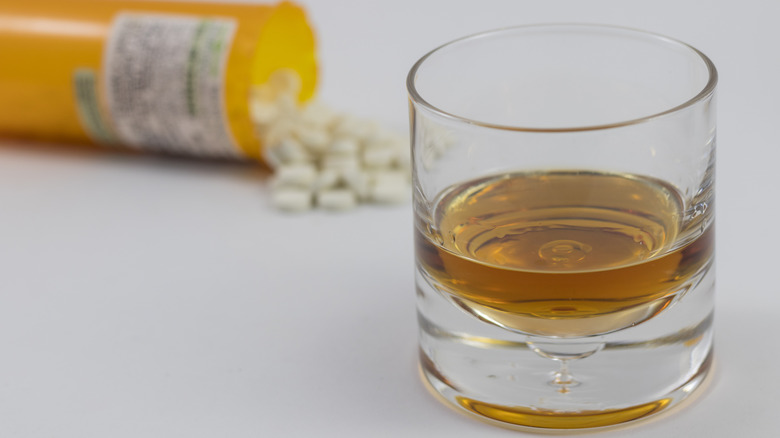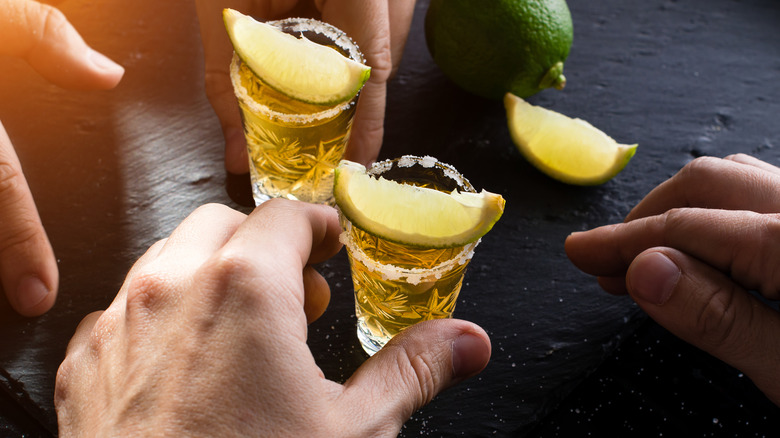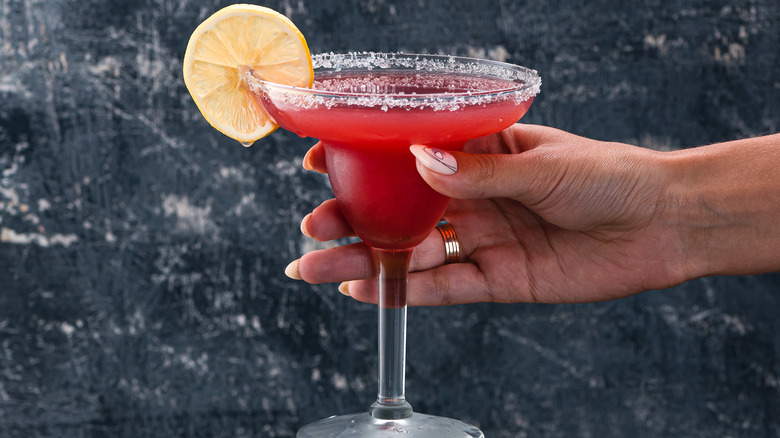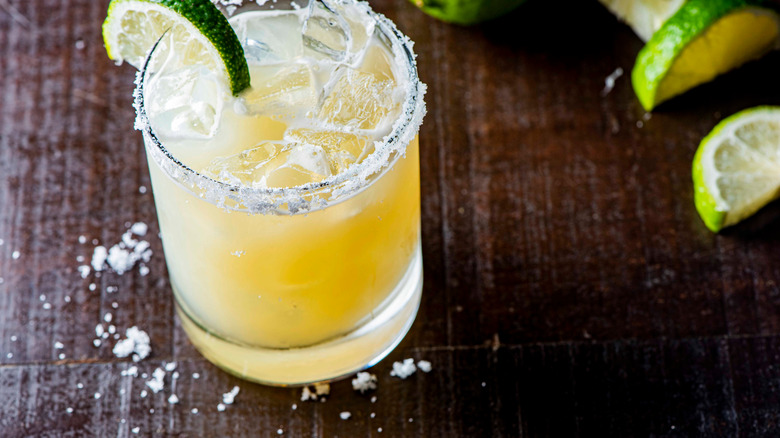What Drinking Tequila Every Night Really Does To Your Body
Spicy margaritas are one of the most enjoyable things in life. Throw some tajin and tequila our way and, well, brunch is going to be lit. Unless, of course, you happened to overindulge one night in college and cannot even smell the stuff without dry heaving. Nevertheless, could drinking tequila every night actually provide you with some health benefits?
From rumors of improving colon health to blood sugar regulation, tequila has transformed its reputation. Still, a mounting body of evidence suggests that tequila can be just as detrimental as other liquors when it comes to your health and wellness. While there are components that make tequila a milder choice, it isn't exactly a health tonic (via WebMD).
In 2020 alone, Mexico produced 374 million liters of tequila. Most of that haul was, in fact, exported to the United States (per Statista). We did some digging to find out the facts behind Mexico's delicious and somewhat nutritious go-go juice.
Hangovers can happen
After a few tequila drinks, your liver begins to break the ethanol down into acetaldehyde (via AlcoRehab). Acetaldehyde is a toxic compound that causes tissue and cell damage, which is what the symptoms of a hangover ultimately are (you know, nausea and headaches). Vodka and tequila tend to be more translucent, signifying their lack of congeners, which are a byproduct of the fermentation process. Congeners aplenty are consumed in darker beverages such as red wine, brandy, and bourbon and they play a role in increasing the severity of hangovers. By this logic, we can conclude that clear spirits might lessen the intensity of a hangover.
That said, the ethanol breakdown and the dehydration alone can have repercussions and cause damage on a cellular level. Fatigue, weakness, excessive thirst, nausea, vomiting, and mood swings signify a hangover reaction to whatever you drank. Typically, the symptoms begin to surface once your blood alcohol level drops (via AlcoRehab).
Alcohol dependence
One of the more concerning and gut-wrenching side effects of the daily enjoyment of tequila is the possibility of developing alcohol dependence. The CDC defines moderate drinking as one drink per day for women and two for men. However, even in moderation, alcohol consumption comes with the risk of dependence.
According to WebMD, knocking a cold one (or two) back daily can absolutely increase your risk of alcohol dependence. The site explained that drinking "too much" looks different for everyone. There is no one-size-fits-all approach when it comes to alcohol consumption. What works in one person's body may completely overwhelm another's.
A notable sign of alcohol dependence is "more frequent consumption or the inability to cut back," according to WebMD. Since alcohol lowers your inhibitions (this is the main thing we remember from Driver's Ed), experts express concern over even moderate consumption having short-term health consequences. These consequences can include, but are not limited to, accidents, violence, risky sexual behavior, and stillbirth or fetal alcohol spectrum disorders in pregnant women (via CDC).
If you or anyone you know is struggling with addiction issues, help is available. Visit the Substance Abuse and Mental Health Services Administration website or contact SAMHSA's National Helpline at 1-800-662-HELP (4357).
Long-term health problems
Consistent consumption of tequila — or any alcohol for that matter — may lead to more harm than good. Overindulgence on a regular basis has been shown to increase the risk for high blood pressure, heart disease, stroke, liver issues, and more, according to the CDC. People who drink in excess have an increased risk of developing cancers of the esophagus, breast, mouth, throat, liver, colon, and rectum. "Social problems, including family problems, job-related problems, and unemployment" are also possible, according to the CDC. Furthermore, mental health problems, depression, and anxiety have all been linked to the overconsumption of alcohol.
This doesn't mean you should never have a paloma or margarita, of course. But you may want to consider cutting back if you're drinking them frequently and in excess. "By not drinking too much, you can reduce the risk of these short- and long-term health risks," explained the CDC.
Immune system damage
Nightly tequila drinking could result in yet another unwanted side effect: lowered immune system function. A 2015 study in Alcohol Research revealed that "alcohol disrupts immune pathways in complex and seemingly paradoxical ways." Simply put, alcohol lowers your ability to fight off illnesses while also contributing to organ damage. Not only that but "large amounts of alcohol blunt your immune system and your body's ability to repair itself," WebMD confirmed.
The 2015 study went on to explain how there are two types of immunity: innate and adaptive. Your innate immune system refers to the system of defense that you were born with. Your adaptive immune system is a subsystem of your innate immune system and is essentially described as the immunity you acquire throughout your life. Alcohol disrupts both immune pathways, especially with excessive use, lowering your defenses against a wide array of infections and systemic inflammation.
Digestive problems
A common side effect of overindulging is the presence of gastritis, which is what happens when the inner lining of your stomach gets worn down or inflamed. While there are plenty of reasons why gastritis could become a problem, alcoholic gastritis is specifically related to the consistent drinking of alcoholic beverages. Slowly but surely, the alcohol can impact your stomach lining's integrity, which can trigger uncomfortable GI symptoms including pain between your ribs and bellybutton, loss of appetite, nausea, and vomiting (via WebMD). Alcoholic gastritis is fairly easy to treat, but if left alone it can parlay into more serious conditions.
Even if you do not end up with gastritis, a nightly dose of Jose Cuervo is not going to do your digestive tract any favors. Drinking can delay the emptying of the stomach, which can ultimately lead to pain throughout the GI tract, according to one report.
Alcohol can interact with certain medications
Alcohol is unlike most other things we put into our bodies. This means that is reacts totally different with other unusual things we may put into our bodies, including certain medications. Alcohol can decrease the desired effect of some medications, while rendering others completely useless. The scary part is that some medications can actually become dangerous when combined with alcohol (via Drugs). You should be especially careful with antidepressents and alcohol use. "One of the most common reasons for using alcohol in conjunction with antidepressant drugs is to achieve some sort of enhanced psychoactive effects from the drug itself; however, these drugs do not produce feelings of elation or euphoria in most people," explained American Addiction Centers.
Combined with prescription or illegal drugs, alcohol can make you feel dizzy or drowsy and potentially lead to internal bleeding, heart problems, or respiratory problems. It is incredibly important to read the labels on your prescriptions and ask your doctor about medicinal interacts with alcohol prior to reaching for that tequila sunrise (WebMD).
If you or anyone you know is struggling with addiction issues, help is available. Visit the Substance Abuse and Mental Health Services Administration website or contact SAMHSA's National Helpline at 1-800-662-HELP (4357).
Your tolerance for alcohol will increase
If you drink tequila every night, you will build a tolerance — but that does not mean that you will be able to squeak around the physiological effects of an old-fashioned hangover. If you have some experience with drinking, you know that the more you do it, the more it takes to catch a buzz. Even if you only fill the shot glass that you got while on vacation in the Bahamas once per night, your body will still adapt by increasing your tolerance (via Verywell Mind). That said, there are several different types of tolerance.
When the brain of a drinker compensates to the extent that alcohol does not interfere with their behavior or bodily functions, this is known as functional tolerance. Acute tolerance occurs during a single drinking session, typically one of the binge-drinking variety. This causes people to feel and appear more intoxicated at the beginning of the party as opposed to the end, even though they have been drinking consistently throughout. Additionally, environmental-dependent tolerance is based on research proving that the effects of alcohol are greater when it is consumed in an unfamiliar environment whereas learned tolerance happens when someone practices a task or skill while under the influence. Lastly, there's metabolic tolerance. It occurs when "a specific group of liver enzymes is activated after a period of chronic drinking and results in more rapid elimination of alcohol from the body," according to Verywell Mind.
Lowered inhibitions, behavior changes, and other short-term risks
Though long-term health effects can impact your future, there are a few short-term health risks associated with alcohol consumption as well. But, hey, don't shoot the messenger. We may all be well aware, but it doesn't hurt to reiterate that people who are under 21, pregnant, recovering from alcoholism, or taking certain medications should not drink tequila, nor other types of alcohol (via WebMD).
WebMD cautions tequila fanatics to imbibe at their own risk. After all, "there is no level of safe alcohol consumption," according to the Better Health Channel. Moderate consumption creates a slippery slope in which one can easily slide into the danger zone, where the health ramifications become more prominent. In addition to the hangover symptoms, lowered inhibitions, violent behavior, alcohol poisoning, and concerns regarding drinking and driving all contribute to what are considered the short-term health risks of daily drinking, as explained by the Better Health Channel.
Tequila is easier on the skin than other spirits
Hallelujah, there might be good news here after all! Well, kind of. "Alcohol is actually one of the worst, most aggressive compounds to destroy your skin," nutritionist Jairo Rodriguez told Vogue. From the dehydrating effects to the general inflammation caused by alcohol, it's not really a surprise to learn this. The upside? Not all liquors are created equal!
When it comes to not destroying your skin while drinking, tequila might just be the ticket. The clearer the liquor, the quicker it clears out of your system (you see what we did there?), Rodriguez revealed. Tequila, vodka, and gin are the top picks for the least amount of epidermal damage. However, the same nutritionist recommends avoiding grain vodkas and going straight for the types made from potatoes due to their clarity and smoothness. To ensure that drinking doesn't wreak total havoc your skin, drink lots of water and, you know, try not to drink tequila every night (per Vogue).
You could increase your risk of osteoporosis
We are here to set the record straight: Tequila, especially when consumed nightly, offers nothing in the way of bone density benefits (via WebMD). While raw agave has beneficial vitamins, this goodness gets lost in translation during fermentation, leaving the boozy concoction with a serious lack of nutritional value. This means it won't protect you from osteoporosis, a condition that can quite literally be defined as "porous bone." It is more prevalent in petite-framed, older women, but a multitude of things can lead to a diagnosis outside of this population (via UC San Diego Health).
Additionally, a 2019 study published in Drug and Alcohol Dependence revealed that there is, in fact, a positive relationship between alcohol and osteoporosis. A person who consumes one to two drinks per day, which is moderate drinking in the eyes of the CDC, has 1.34 times the risk of developing osteoporosis when compared to non-drinkers. Furthermore, a person who consumes 2 or more drinks per day has a 1.63 times higher likelihood of developing osteoporosis.
It may not impact your blood sugar
Tequila is devoid of sugar, which is excellent — except for that tequila tastes great when combined with sugary syrups and fruit juices so, keep that in mind. Most classic alcoholic beverages don't contain sugar on their own, but tequila still has a lower-calorie profile than many other options. For example, wine has anywhere from 90 to 224 calories in a 4-ounce pour. This varies based on the kind of wine. Beer can have up to 262 calories per can, depending on the brew (via Calories). When we consider the alternatives, the casual 64 calories in one shot of an 80-proof tequila seems pretty reasonable (via WebMD).
Additionally, tequila contains agave, which is low on the glycemic index, according to Verywell Health. "Agave contains agavins that may provide sweetness and nutrition without impacting blood sugar levels," Medical News Today explained. "This is because the body cannot absorb them."
You might experience depression
Unfortunate as it is, alcohol and depression go together like peanut butter and jelly. Many people turn to alcohol as a means of drowning their sorrows, whatever they may be. According to WebMD, nearly a third of people with serious depression also have an alcohol problem. Typically, as the site explains, the depression comes first and the drinking follows as a coping mechanism of sorts, but this isn't true in all cases.
Women are more likely than men to start drinking heavily if they already have a history of depression. Depression is almost always exacerbated by drinking and can often lead to thoughts of suicide. Alcohol consumption can often reduce the effectiveness of antidepressants, setting the scene for more intense and frequent depressive episodes (via WebMD).
If you or anyone you know is having suicidal thoughts, please call the National Suicide Prevention Lifeline at 1-800-273-TALK (8255).






